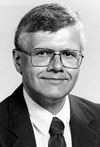Research award trains future investigators
by Cindy AbolePublic Relations
In an effort to spur the interest of young investigators and respond to the call for expanded support for federally-sponsored clinical research, MUSC joins a group of 50 national research institutions to sponsor the Clinical Research Curriculum Award.
Known as the K30 award, the two-year program steers health professionals towards career development through clinical research training and prepares them through an extensive, multidisciplinary program that uses the guidance of mentors, formal course work and knowledge gained from experts working in patient-oriented research.
The program, coordinated and funded through the National Heart, Lung and Blood Institute for the NIH, will draw talent from three levels of eligible participants: students; medical research fellows and clinical junior faculty. Medical and dental students will follow a one-year tract, while fellows and faculty complete the two-year program through the Master of Science in Clinical Research program with possible financial support for tuition costs.
Physicians, pharmacy doctorate professionals, clinical doctorate faculty, nurse practitioners, clinical psychologists or other licensed specialists with clinical responsibilities may qualify as eligible research fellows or junior faculty.
 Dr.
L. Lyndon Key
Dr.
L. Lyndon Key
“This type of training is generally presented to those individuals who are heading into basic science and allows them to know precisely how to report on medical research findings,” said L. Lyndon Key, M.D., K30 program director. This is the first time the clinical scientist has had access to a similar training program that teaches research in clinical sciences. The award's outcome will eventually produce a corps of highly-skilled and independent clinical investigators who will be trained and ready to compete for prized research funding.
The K30 compliments the newly established Master of Science in Clinical Research program created under MUSC's Department of Biometry and Epidemiology. Its structure features a varied course curriculum accredited by the S.C. Commission on Higher Education, participation in an ongoing seminar series, mentoring and valuable research experience.
Under the K30 program, participants attend seminar topics on grant writing, FDA regulations, patents, IRB approval and compliance. Other didactic training focuses on course work in epidemiology and biostatistics related to clinical trial design, methodology, statistical analysis and critical review.
“MUSC does an outstanding job in the area of basic research training,” said Thomas Hulsey, MSPH, ScD., clinical masters director and K30 associate program director. “What we want to do is add on to this by bringing along those talented individuals who possess the necessary training to help translate their work from benchside research to bedside care.”
The recent passage of the Clinical Research Enhancement Act of 1999 has opened the door to increased involvement of NIH clinical research training for graduate and mid-career investigators and other opportunities. It has also established a loan repayment initiative to assist health professionals committed to conduct ongoing clinical research. Eligible participants can apply for up to $35,000 in tuition assistance for three years, tax-free.
“This is good news for people on the clinical research track who've had to leave research and enter private practice as a way to reduce their debt and repay loans,” Key said. “They never come back. But programs like the curriculum research award stimulates those who choose to go through this type of training and emerge as a well-trained, 'card carrying' researcher. They are the people who expect to have an NIH-funded career and this program allows them to do that.”
A key component to the K30 program is its inclusion of qualified faculty and experienced researchers in the College of Mentors, who will provide guidance and direction to trainees in various areas of clinical research. Upon completion of the program, participants will complete an actual grant proposal.
“The program brings together existing talents in a concerted effort that will ultimately strengthen contributions and opportunities for clinical research,” Hulsey said. “It will be a continual work in progress.”
Students enrolled in the medical scientist training program have recognized the synergistic benefits of didactic training offered through courses in the clinical masters program. Students take them as senior electives to help prepare them for careers as clinical investigators.
“Having the K-30 program is an important step for MUSC,” said Perry Halushka, M.D., Ph.D., director of the Medical Scientist in Training program and dean of the College of Graduate Studies. “It comes at a time where our country needs more trained clinical investigators and the NIH has recognized that we have qualified faculty to train clinicians to become clinical scientists.”
Joining Key and Hulsey as core faculty for the program is: Brent Egan, M.D., associate program director of the GCRC; Perry V. Halushka, MD., Ph.D., dean of the College of Graduate Studies; Mark S. George, M.D., team leader of the Functional Neuroimaging Research Division, Department of Psychiatry; Steven D. London, DDS, Ph.D., associate dean of research and basic sciences, College of Dental Medicine; Barbara K. Haight, MSN, Dr.PH., professor and senior scholar, College of Nursing; and Amy Blue, Ph.D., program evaluator and assistant dean for curriculum evaluation, College of Medicine.
According to Key, the program's effectiveness will be continually assessed for important feedback and program oversight. To accomplish this, an advisory committee has been established to monitor and help guide the program.
“Over time, we'll learn how to effectively target the right groups for the program based upon on-going assessments by students, fellows or faculty,” Key said. “Having a clear, clinical research path for fellows may improve things for that group in the future. We just don't know the answer to that right now. We're hoping that the use of evaluations will help guide us to which areas we need to focus on.”
The deadline for applications to the Clinical Research Curriculum Award is June 1.
For more information about the program, contact Jennifer Vazquez, program
coordinator at 792-8449.